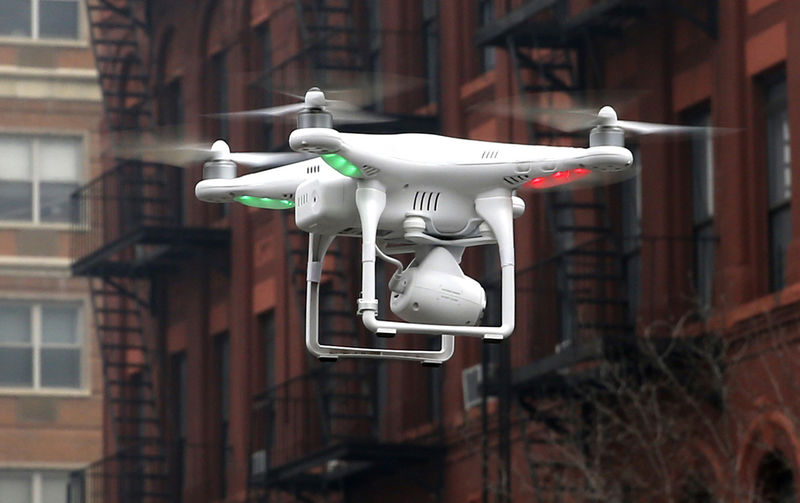By Alwyn Scott
NEW YORK (Reuters) - The U.S. aviation regulator proposed rules on Sunday for commercial drone flights that would lift some restrictions but would still bar activities such as the delivery of packages and inspection of pipelines that have been eyed by companies as a potentially breakthrough use of the technology.
The long-awaited draft rules from the Federal Aviation Administration would require unmanned aircraft pilots to obtain special pilot certificates, stay away from bystanders and fly only during the day. They limit flying speed to 100 miles per hour (160 kph) and the altitude to 500 feet (152 meters) above ground level.
The rules also say pilots must remain in the line of sight of its radio-control drone, which could limit inspection of pipelines, crops, and electrical towers that are one of the major uses envisioned by companies.
The FAA acknowledged the limitation but said those flights could be made possible with a secondary spotter working with the pilot of the drone.
"This rule does not deal with beyond line of sight, but does allow for the use of a visual observer to augment line of sight by the operator of the unmanned aircraft," FAA Administrator Michael Huerta said in a conference call with reporters on Sunday.
The draft rules, nearly 10 years in the making, still must undergo public comment and revision before becoming final, a process expected to take at least a year.
If they survive in their current form, they would be unlikely to help Amazon.com (NASDAQ:AMZN.O) in its quest to eventually deliver packages with unmanned drones, since they require an FAA-certified small drone pilot to fly the aircraft and keep it in line of sight at all times - factors not envisioned in the online retailer's plan.
Huerta also said, "We don't consider or contemplate in this rule carrying packages outside of the aircraft itself."
Amazon's vice president of global public policy, Paul Misener, said the proposal would bar the company's delivery drones in the United States. Misener also urged the FAA to address the needs of Amazon and its customers as it carried out its formal rulemaking process.
"We are committed to realizing our vision ... and are prepared to deploy where we have the regulatory support we need," Misener said in an emailed statement.
Other countries have taken a more permissive stance towards delivery drones. In September, logistics firm DHL said its use of drones to drop off packages to residents of a German island was the first such authorized flight in Europe.
"The United States cannot afford to lag behind other countries in technological innovation because of regulatory foot-dragging," U.S. Senator Cory Booker, a New Jersey Democrat, said in an emailed statement.
RULES EXPECTED TO EVOLVE
Huerta, who said the agency had tried to be "flexible" in writing the rules, said they set a framework and would evolve based on discussions with industry and technology developments.
The rules continue current restrictions against filming of crowds by news organizations, but Huerta said he expected those procedures to be developed as part of discussions with news groups.
Separately, President Barack Obama issued a memo outlining principles for government use of drones, covering such issues as privacy protections and oversight of federal drone use.
The FAA's draft rules appeared less onerous in some aspects than the industry had been worried about. There had been concern, for example, that they would require drone operators to attend a flight-training school and obtain a certification similar to that of a manned aircraft pilot.
Commercial drone operators would need to be at least 17 years old, pass an aeronautical knowledge test and be vetted by the Transportation Security Administration. But they would not need to undergo the medical tests or flight hours required of manned aircraft pilots.
"I am very pleased to see a much more reasonable approach to future regulation than many feared," said Brendan Schulman, a lawyer who works on drone issues at Kramer Levin Naftalis & Frankel in New York.
The proposal would benefit U.S. farmers and ranchers as it would enable them to scout fields more efficiently, said R.J. Karney, director of Congressional relations at the American Farm Bureau Federation.
The Association for Unmanned Vehicle Systems International (AUVSI), also praised the draft. The group's president, Brian Wynne, called it a "good first step in an evolutionary process."
But privacy advocates were concerned there were not enough limits on when law enforcement agencies would be permitted to use drones for surveillance.
The proposal "allows the use of data gathered by domestic drones for any 'authorized purpose', which is not defined, leaving the door open to inappropriate drone use by federal agencies," said Neema Singh Guliani, legislative counsel at the Washington legislative office of the American Civil Liberties Union, in an emailed statement.

(The story was refiled to change "pilot" to "drone" in the third paragraph)